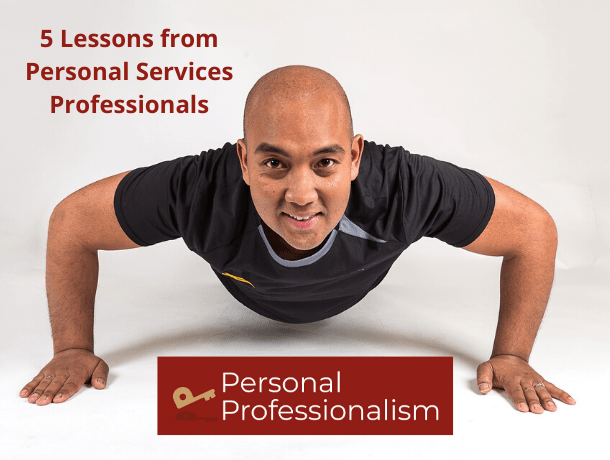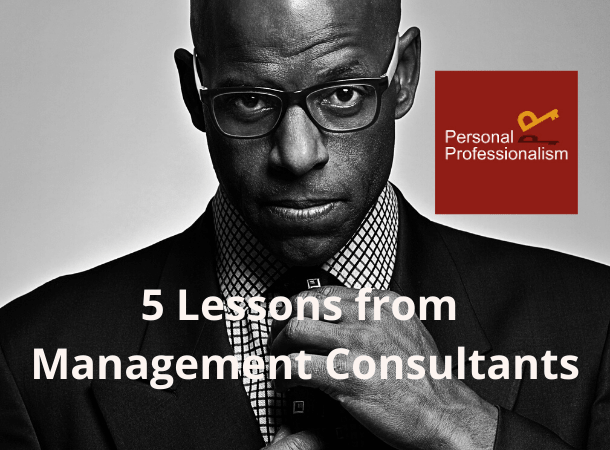5 top lessons from Personal Services professionals that you can apply today!

“I clean for them”; “I walk their dog” or “I get them fit”; people who work in personal services get to know their clients and their clients’ lives very intimately.
And that presents challenges to their professionalism.
Here are five top professionalism lessons from Personal Services providers that you can apply to your Work Role.
1. Discretion – it’s all about trust
“The things I’ve seen!” one cleaner told me. He was too discrete to tell me what those things were – which is, of course, the whole point! You are entering people’s homes and seeing their personal lives.
“I have to remember that I am in people’s homes to work and not for my own amusement!”
His clients trust him not only to do the cleaning and to do it well, but also to keep any family secrets he might observe himself.
What he has learnt, he tells me, is to separate working life from personal life. If he saw some of the things he’s seen at a friend’s house, he might laugh and even tease his friend, but he is much more matter-of-fact when he’s working.

“It’s as if I don’t see the same things when I’m working; they’re just things to be cleaned or moved around and I don’t really think about it too much. When I really think about it, I am too focused on work to pay much attention to embarrassing things.”
2. Purpose – Never forget it’s a business
Personal services providers typically tell me that many of their customers become their friends. This is often because they are friendly, caring people who get to know their clients on a very personal level.
With experience, they have learnt that they still have to remember that they are running a business.
You still have to issue invoices and make sure you are paid – it’s tempting to allow ‘friends’ to owe you money and let payment slide.
Equally, you can’t slack off – clients are depending on you. They’re not paying you to be their friend, they’re paying you to do your job and to do it well.

For Lyn, that was a hard lesson. “I made the mistake of drifting in to a friendship. I didn’t occur to me at the time, but I started to arrive a little late, leave a little early, spend time chatting over tea. I guess (my former client) felt a bit the same which made it hard for her to tell me to get on with my job”.
Ultimately, Lyn was moved aside and the former client now uses a new (service provider). “I understand and am not angry or anything. But I never made that mistake again”.
Being friendly and being a friend are very, very different things!
3. Work-Role – it’s not just a job, it’s a whole role
There are all sorts of tasks to do as well as the job at hand.
Personal trainers have to make sure that all of their fitness equipment is safe and clean, ready to use. “A worn skipping rope just looks bad” says Vicky.

Clean, well maintained fitness equipment shows that I take care about who uses it. That the gear will help them get fit, not break in their hand or pass on germs from the last user!
This might not be noticed when it’s clean, but it’s definitely noticed when it’s not! And that takes away just a little bit from impressions of professionalism.
There is so much to do before even seeing a customer. But taking the time to do it means that I am ‘all theirs’ when I am with them, and am not distracted.
4. Presence – Care, but don’t get too close
“I work very closely with some of my clients. I am helping them with some very personal issues”. Community nurse, Claire, tells me that in order for her to be able to do her job, she needs very personal information from her clients.
That sometimes means that clients can come to see her as a friend, not a practitioner.
“Oh yes, I care” she tells me. “But I need to make tough decisions based on the best rational outcome for each client. Yes, I need to be aware of their emotions and fears but I can’t be overly swayed by them.”
If Claire were to become personally close to a patient, she is aware that she might make decisions as a friend and not as a professional.
And that’s when mistakes happen. That’s when she is aware that she might make decisions in order to make the client happy, and not based on the wisdom of her skills, knowledge, training and experience – and her agency’s professional guidelines.
“I need to have a relationship with each client, each person, that is close enough that I can get the information I need to help them. But I HAVE to keep a distance so that I don’t get too involved. I am an emotional person in my own life, but I can’t afford to be
“Oh, and I never, ever accept gifts. That’s what friends do.”
5. Be able to separate ‘wants’ from ‘needs’
Part of the professional’s job is to help people to understand what they need rather than what they think they need… or want.
“I hadn’t really thought about it like this, but if someone comes to me and says that they want ‘X’, it’s up to me to find out what they want it for, then help them understand what they need rather than want.”
Gary, a so-called handyman, quickly learned that he had to help his clients in the long run. More often than not, they come around to agreeing with Gary’s advice in time. They might not like it at the time, but understand it after a while. Gary believes that he does his clients no favours by ‘giving in’ to what they want.
In the end…
Being professional isn’t as easy as performing tasks and being nice to people. If only! No, it’s about remembering that you are there to support people, provide a service and deliver true value.






